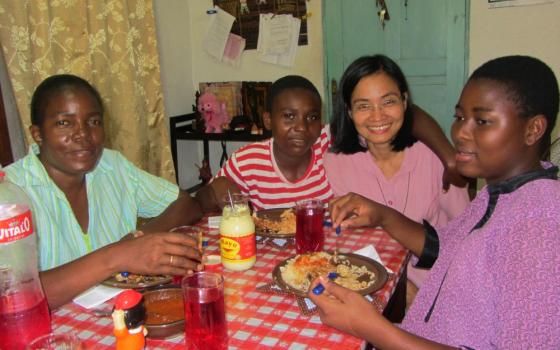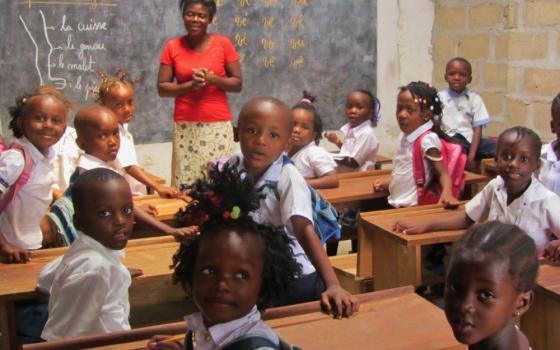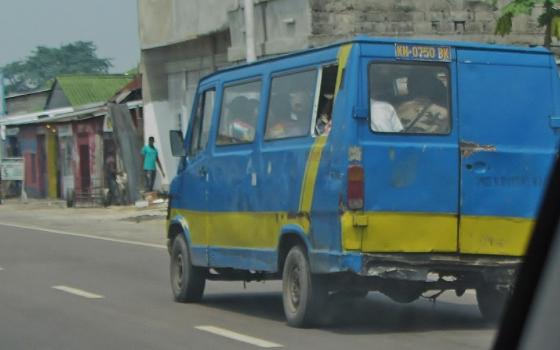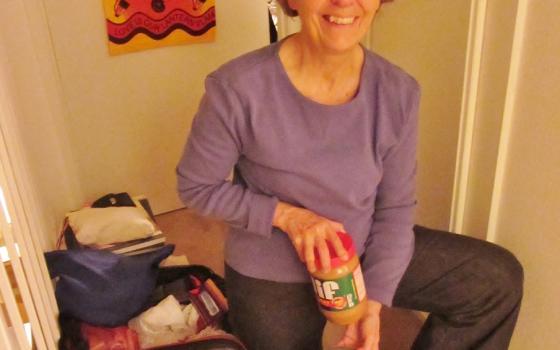Wrenching poverty, conflict and injustice. These are the conditions of the over 9 million people of Kinshasa, the capital city of the Democratic Republic of Congo – although this may not be an accurate count since a census of the country has not been taken since 1960. How does the population keep hope in such conditions? As we were riding through the streets on public transportation, packed in among the people, the unrest was palpable in neighborhoods teeming with brilliant color and noise.
I was there in January for the meeting Confederation of Major Superiors of Africa and Madagascar (COMSAM) and to visit sisters to find new contacts for Global SistersReport in the DRC.
People slave in squalid conditions, eking out an inadequate living by selling food and goods along the roads and in informal markets. In contrast, on other trips in the city I saw beautifully clean streets, tree- and flower-lined boulevards and luxurious hotels advertising sumptuous meals. These contrasts were amazing and disconcerting. It is clear that new political and development strategies are needed to bring about the required changes to bring this rich and diverse country into the 21st century where people can feel humanized rather than powerless. But, how can it be accomplished? It seems an unanswerable question.
The government isolates itself from the people and is fearful of them. This was so evident when I was planning to leave the country. We awoke to protest demonstrations that were paralyzing the city. Driving to the airport we saw truckloads of soldiers, many mercenaries, being mobilized in every direction; roadblocks inhibited use of certain roads and streets; buses, the primary means of transportation, sat empty and waiting in long rows along city curbs. Reactions to these measures erupted into violence, deaths, looting and burning and stoning of businesses and buses. In response, the government took even stronger counter measures, shutting down all communication networks, cell phones and Internet. Catholic church authorities had supported the peaceful demonstrations of the people knowing well the endemic corruption and injustice of the current government. They too protested, but to no avail.
Sisters, bishops and clergy all support the people’s efforts to seek change, encouraging them not to give up hope and not to succumb to the same behaviors as their leaders.
The Verbum Dei Sisters living in one of the poorest areas of the city are part of this support. They provide a small school with kindergarten and three grades and employment to several teachers. Without them there would be no chance for education for these kids, beautiful kids full of life and energy.
Three sisters and two candidates have a small, two-story house nestled among other small homes. Their space was so small they could hardly fit in another chair for me to sit at their table. This international community is from Congo, Guinea and the Philippines. Two Congolese candidates are discerning if this might be their way of life, both attracted to the Verbum Dei charism of sharing the Word of God with others.
The sisters share the insecurity of the people around them, wondering how to keep safe and how to make ends meet. When I was arranging to visit them I asked what I might bring. They surprised me by suggesting peanut butter and tuna fish.
Peanuts are a common crop in DRC, but the sisters have no space to garden and must buy even common foods at exorbitantly high prices, often needing to pay in U.S. dollars, the current currency.
Being Asian makes Sister Lorna from the Philippines very vulnerable. Often mistaken for Chinese she has been the focus of hatred and bias, insulted, spit at and pushed about. The Congolese despise the Chinese because the government has handed them so much power in the DRC. Although their presence has brought many benefits – good roads and strong, new buildings – it has also brought new corruption and competition. The Chinese companies exploit the people by selling cheap goods at high prices. They bring their own workers from China rather than hire local people, and lately, they are taking informal markets from the Congolese women who make their living by selling food products and vegetables. Chinese women are now imitating these activities, taking away the only employment most women here have.
The Verbum Dei Missionaries offer spiritual ministry with the people of the neighborhood where adults and youth groups come to their small chapel to pray and learn about the Bible.
I was so amazed at the Catholicity of the country. Almost 50 percent of the people are Catholics, and nearly 60 percent of the population has been educated in Catholic grade schools; 40 percent are graduates of Catholic high schools.
However, as in many African countries, evangelical churches are proliferating. Some say the rapid growth is the result of menus that offer, even ensure, miracles and quick fixes to problems and desperation. Unfortunately, some find out too late that quick fixes are not possible. One sad story was told of a woman who left her very sick child at the church, expecting God to heal her, only to find later the promise was not fulfilled. When she finally rushed to the clinic, it was too late, and the baby died.
I must admit, being in Kinshasa was like being on a seesaw of emotions. I had moments of feeling hopeless as I moved from place to place in the city, seeing the poverty and hearing talk about how beautiful Kinshasa once was compared to what it is now. In contrast I had moments of hope and excitement celebrating with hundreds of people their faith and commitment to Christ at the Congolese Rite of Mass that lasted three hours on Sundays. Even the demonstrations of protest raised both hope and fear. They symbolized the positive energy that can come from faith, but also the fears that come from confrontations of violence and retaliation between the people and the government.
[Joyce Meyer, PBVM, is international liaison for Global Sisters Report.]






